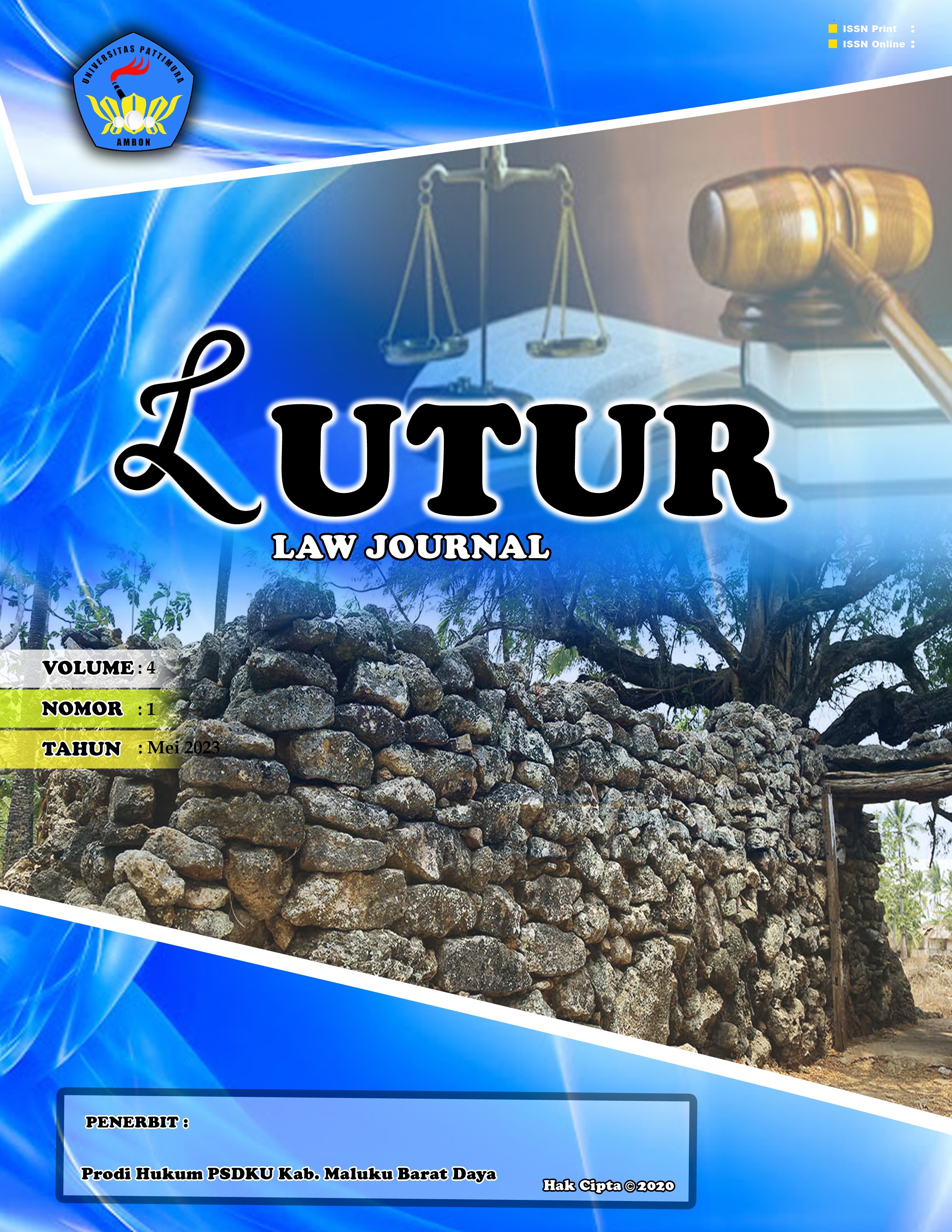Implementasi Tugas Hakim Pengawas Dan Pengamat Terhadap Pelaksanaan Putusan Pengadilan Pada Lembaga Pemasyarakatan Di Indonesia
Abstract
The institution of supervisory judges and observers is a new institution that was born with the enactment of Law No. 8 of 1981 concerning the Criminal Procedure Code. The task of supervision and observation is very important, considering that its duties are not only related to convicts who have been sentenced, but also to convicts who have finished serving their sentences with the aim that there is a guarantee that the decisions handed down by the court are carried out properly. Purposes of the Research: The type of research used is normative legal research using a statute approach, a conceptual approach, and a case approach. While the sources of legal materials used are primary legal materials, secondary legal materials and tertiary legal materials. Results of the Research: From the results of the study, it is explained that supervisory judges and observers are very relevant in the implementation of the current criminal justice system because with the presence of supervisory judges and observers they can carry out direct supervision and observation of court criminal decisions that have legal force and can directly assess whether the decision can be useful. for prisoners or not so that when he is ready to return to the midst of society so that the purpose of the criminal justice system that corrects the perpetrators can be realized, but as long as in Indonesia the implementation of the rights of supervisors and observers is not carried out properly, this is due to the absence of strict sanctions to judges and courts, the lack of regulations and provisions regarding supervisory and observer judges, as well as supervisory and observer judges can be considered as interfering formally with the authority of the penitentiary, therefore the cooperation of the ministry of law is required. and human rights and the judiciary to formulate new regulations for supervisory and observer judges.
Downloads
References
Buku
Bambang Sutiyoso dan Sri Hastuti Puspita Sari, Aspek-Aspek Perkembangan Kekuasaan Kehakiman Indonesia, Catatan Ke-1, Yogyakarta UII Perss, 2005.
M. Faal, Penyaringan Perkara Pidana Oleh Polisi (Diskresi Kepolisian), Pradnya Paramita : Jakarta, 1991.
Mien Rukmini, Aspek Hukum Pidana dan Kriminologi (Sebuah Bunga Rampai), Alumni, Bandung, 2006.
M. Yahya Harahap, Pembahasan Permasalahan dan Penerapan KUHAP: Penyidikan dan Penuntutan, Sinar Grafika, Jakarta, 2005.
Mohammad Taufik Makarao dan Suhasril, Hukum Acara Pidana dalam Teori dan Praktik, Ghalia Indonesia, Jakarta, 2004.
Romli Atmasasmita, Sistem Peradilan Pidana Perspektif Eksistensialisme Dan Oblisasonisme, Putra Abidin. Jakarta, 1996.
Romli Atmasasmita dalam Edi Setiadi dan Kristian, Sistem Peradilan Pidana Terpadu Dan Sistem Penegakan Hukum Di Indonesia, Penerbit Prenadamedia Group, Jakarta, 2017.
Ronny Hanitijo, Metodologi Penelitian Hukum dan Jurimetri, Ghalia Indonesia, Jakarta, 1998.
Samuel Enoch Stumpt, Philosophy, History and Problems, Singapore: McGraw-Hill Book1989.
Samsul Wahidin, Politik Penegakan Hukum Di Indonesia, Pustaka Pelajar, Yogyakarta, 2017.
Sudarto, Kapita Selekta Hukum Pidana, Alumni Bandung, 1981.
Tolib Effendi, Sistem Peradilan Pidana, Pustaka Yustisia, Yogyakarta, 2013.
Yesmil Anwar dan Ailang, Sistem Peradilan Pidana, Widya Pajajaran, Bandung, 2009.
Skripsi, Tesis, Distertasi, Online/World Wide Web dan Lain-Lain
Muladi, Polisi dan Hak Asasi Manusia, Makalah pada Seminar nasional Polisi Indonesia I di Undip Semarang, 1995.
Ramli Atmasasmita, “Masalah Pembinaan White Collar Crime Di Indonesia”, Makalah disampaikan pada Seminar Pemasyarakatan Terpidana II di Jakarta, 8-9 November 1993.
Rifanly Potabuga, “pidana penjara menurut KUHP,” 2012,https://media.neliti.com/media/publications/3163‐ID‐pidana‐penjara‐menurut‐kuhp.pdf.
Copyright (c) 2023 Robertho Sohilait, Deassy Jacomina Anthoneta Hehanussa, Juanrico Alfaromona Sumarezs Titahelu

This work is licensed under a Creative Commons Attribution-NonCommercial 4.0 International License.
Authors who publish their manuscripts in this Journal agree to the following conditions:
- The copyright in each article belongs to the author, as well as the right to patent.
- Authors are able to enter into separate, additional contractual arrangements for the non-exclusive distribution of the journal's published version of the work (e.g., post it to an institutional repository or publish it in a book), with an acknowledgment of its initial publication in this journal.
- Authors are permitted and encouraged to post their work online (e.g., in institutional repositories or on their website) prior to and during the submission process, as it can lead to productive exchanges, as well as earlier and greater citation of published work.
- Authors have the right to self-archiving of the article (Author Self-Archiving Policy)














